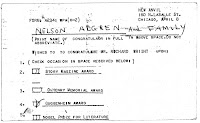Fifty years ago today, Richard Wright died in Paris, just over 50 years old. From a poor sharecropping family in Mississippi, he grew up in a single-parent household and made his way in Chicago toward stability and into his life as an author. He became the poet, as Isabel Wilkerson writes in
The Warmth of Other Suns
, of the Great Migration (the title of her book comes from Wright).
What I found in exploring Wright’s letters and work in research for
Soul of a People
was, first, how much the Writers’ Project connected young writers and helped shape Wright’s own path. He charted his move from Chicago to New York in 1937 as a way to get to the heart of American publishing, and his instrument for that was the Project. “When I go tonight, I will have forty dollars in my pocket,” he told his friend Margaret Walker as they rode the El his last night in Chicago. Wright hoped he could swing a transfer to the Writers’ Project office in Manhattan. He confided, “I hope I’m not making a mistake, going this way.”
Even after he burst on the New York literary scene with
Uncle Tom’s Children
and later with the bestseller
Native Son
(which benefitted from Walker’s research in Chicago), Wright remembered friends from his WPA days. He kept up a startling and often funny dialogue with Nelson Algren for years (see Algren's postcard above, and
this piece in the American Scholar), and mentored younger writers. Wright was a complex and charged personality, and no loyalty was easy. Yet in a Town Hall radio debate about the New Deal projects in April 1939, Wright spoke up for the increasingly unpopular arts programs. As a young black writer, he said, the WPA’s cultural programs served “to keep alive in the hearts of youth the dream of a free and equal mankind, a dream which, if allowed to die, will open the gates to a ruthless and brutal tide of fascism…”
Today, in honor of Wright, the teachers’ seminar at the University of Kansas known as
The Wright Connection, asks people to share impressions about Wright as they have come to know him, through reading, teaching, and otherwise. Says director Maryemma Graham, “We want to use the 50th anniversary to promote further readings and rereadings, to locate new avenues to and from Wright for our students, and engage Wright through contemporary forms of scholarly inquiry.” She points to
their website for postings, where you’ll find her own reflections along with those of Wright's daughter Julia and others.





No comments:
Post a Comment